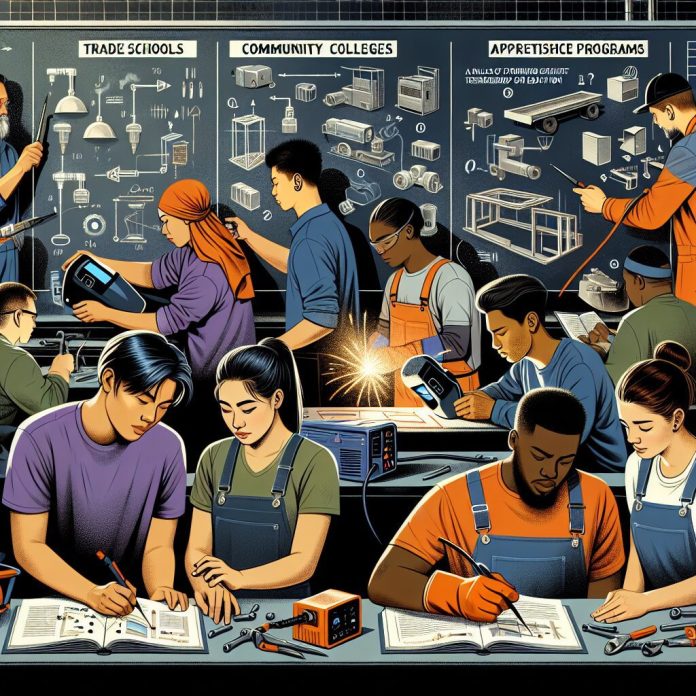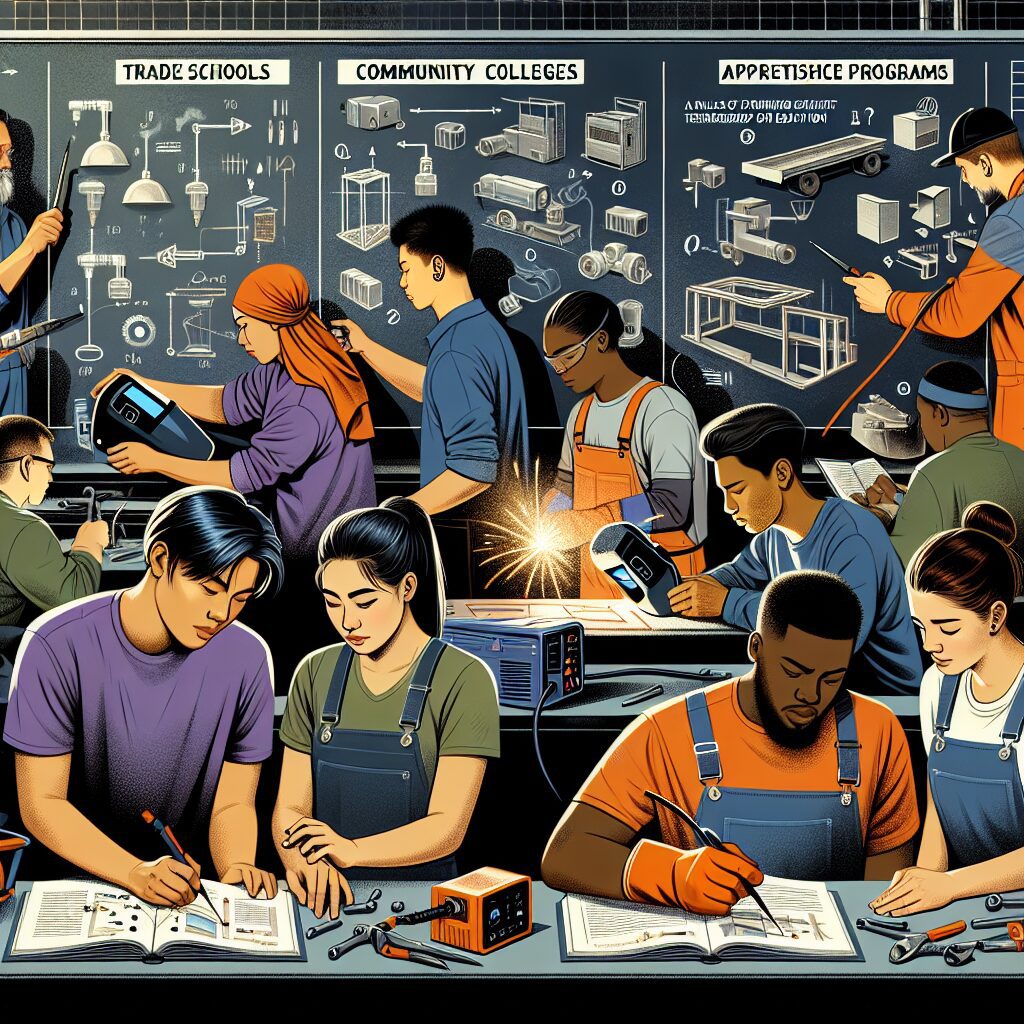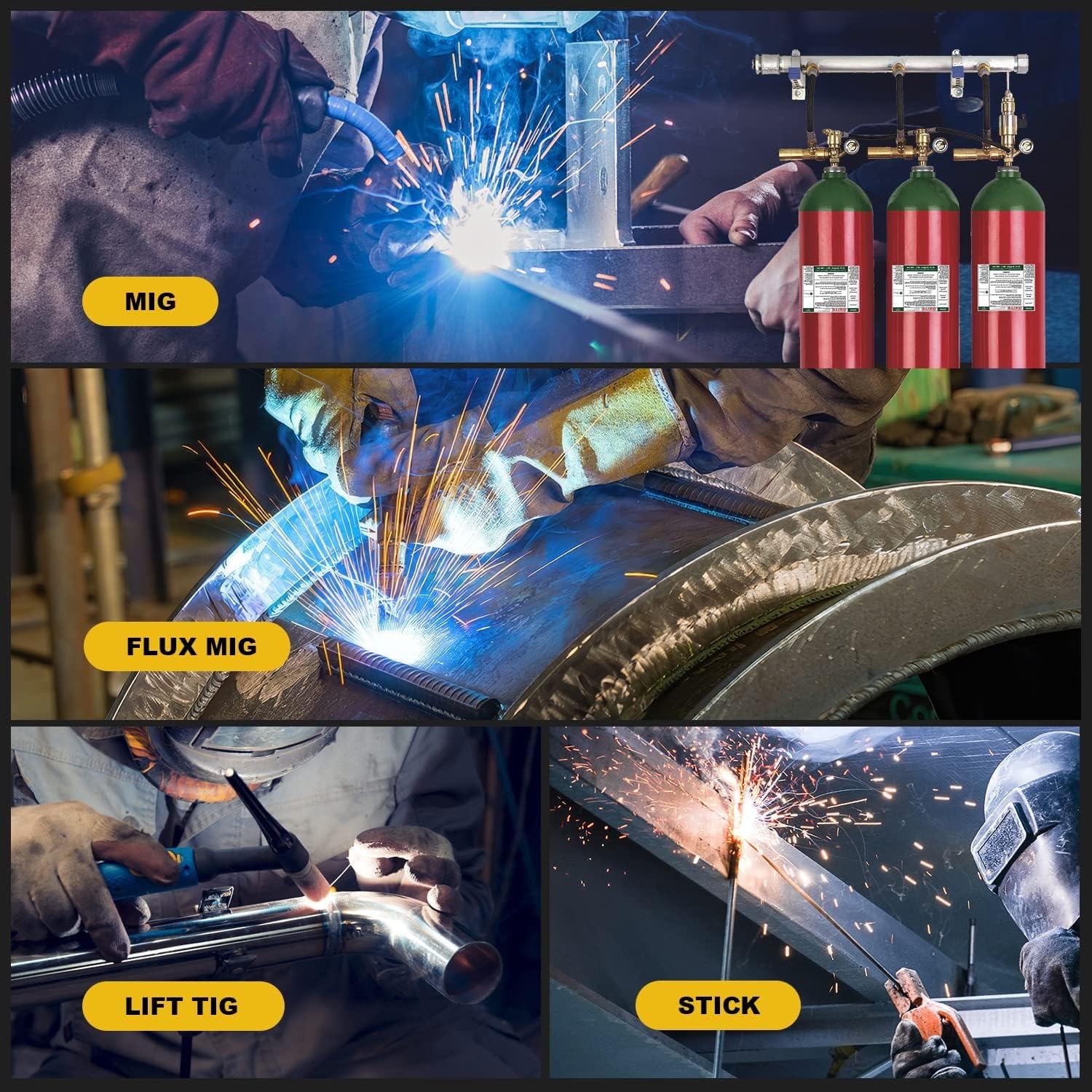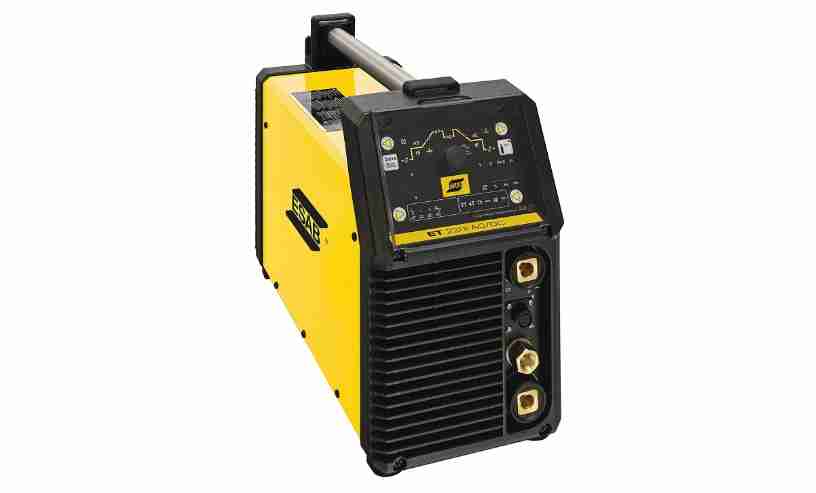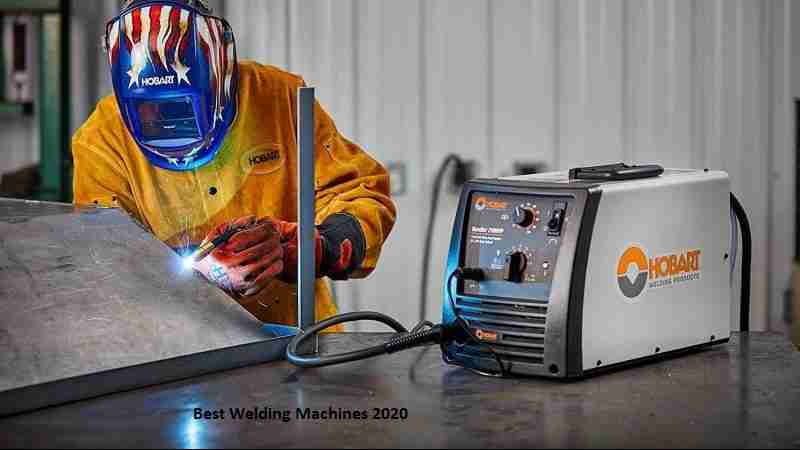If you’re interested in pursuing a career in welding, you might be wondering where you can acquire the necessary training and education to kickstart your journey. Fortunately, there are numerous options available for aspiring welders. From vocational schools to community colleges, specialized training centers to apprenticeship programs, the opportunities are abundant. Whether you prefer hands-on learning or a more structured classroom setting, the path to becoming a skilled welder is within reach. In this article, we will explore some of the key avenues where you can acquire the knowledge and skills required to excel in the world of welding.
Trade schools
Trade schools are institutions that specialize in providing hands-on training and education for specific trades, including welding. These schools offer programs that are focused solely on teaching the skills needed to become a professional welder. Trade schools often have small class sizes and a curriculum that is tailored to meet industry demands.
Community colleges
Community colleges are an excellent option for individuals who are looking for a more affordable and flexible way to obtain welding training and education. These institutions offer associate’s degree programs in welding technology, which typically take around two years to complete. Community colleges provide a well-rounded education that includes both theoretical knowledge and practical experience in welding techniques.
Vocational schools
Vocational schools are specifically designed to provide students with the skills and knowledge needed to enter the workforce in a particular trade. These schools offer focused training programs for welding, allowing students to quickly acquire the necessary skills to start a career in welding. Vocational schools often have strong connections with local industries, providing students with valuable networking opportunities.
Technical institutes
Technical institutes specialize in providing students with intensive, industry-specific training in a variety of fields, including welding. These institutes offer programs that are specifically geared towards providing hands-on instruction and real-world experience. Technical institutes often have state-of-the-art facilities and equipment, ensuring that students receive training on the latest welding technologies and techniques.
Apprenticeship programs
Apprenticeship programs provide individuals with the unique opportunity to learn the craft of welding while getting paid. These programs typically combine on-the-job training with classroom instruction, allowing apprentices to gain practical experience under the guidance of experienced welders.
Union-sponsored programs
Many trade unions offer apprenticeship programs for aspiring welders. These programs are typically highly structured and can last anywhere from three to five years. Union-sponsored apprenticeships provide participants with a comprehensive education in welding and often include rotations through different areas of the industry to gain a well-rounded skill set.
Non-union programs
Non-union apprenticeship programs also exist and can provide similar training opportunities for aspiring welders. These programs are typically sponsored by private companies or industry associations. Non-union apprenticeships often have a more flexible structure and may vary in duration and curriculum depending on the sponsoring organization.
Government-sponsored programs
The government also offers apprenticeship programs for welding, primarily through agencies such as the Department of Labor. These programs are designed to provide individuals with training and employment opportunities in high-demand industries, including welding. Government-sponsored apprenticeship programs often come with additional benefits, such as financial assistance and job placement assistance.
Online platforms and courses
In today’s digital age, online platforms and courses have become increasingly popular options for individuals seeking welding training and education. These platforms offer the flexibility to learn at your own pace and from the comfort of your own home.
Websites offering welding courses
Several websites specialize in offering online welding courses, covering a wide range of topics and skill levels. These courses provide video tutorials, interactive exercises, and assessments to ensure that learners can acquire the necessary skills. Websites offering welding courses often have options for beginners as well as advanced welders looking to expand their knowledge.
Virtual training programs
Virtual training programs utilize cutting-edge technology to deliver hands-on welding training in a virtual environment. Students can practice welding techniques using virtual reality simulations that mimic real-world scenarios. Virtual training programs offer a cost-effective and safe way to gain practical experience before working with actual welding equipment.
Online welding certifications
Some online platforms also offer welding certification programs, allowing individuals to obtain recognized credentials without having to attend traditional in-person training. Online welding certifications typically require students to complete a series of courses and pass comprehensive exams to demonstrate their proficiency in various welding techniques and safety practices.
Welding certification programs
Welding certification programs are specifically designed to prepare individuals for the certification examinations required to become a professional welder. These programs focus on teaching the specific skills and knowledge needed to pass certification exams.
Certification examinations
Certification examinations are conducted by professional organizations to assess an individual’s welding skills and knowledge. These examinations often consist of practical welding tests and written exams. Welding certification programs provide comprehensive training to help individuals prepare for these examinations, ensuring they have the necessary skills and knowledge to pass with confidence.
Training centers for certifications
Some organizations, such as the American Welding Society (AWS), have established training centers that offer comprehensive certification preparation programs. These training centers provide hands-on instruction and practice exams to help individuals prepare for the certification process. Training centers often have experienced instructors who can provide valuable guidance and feedback during the training process.
Professional organizations offering certifications
Professional organizations, such as the AWS, offer certifications that are widely recognized in the welding industry. These certifications validate an individual’s skills and knowledge in specific welding processes, such as structural welding, pipe welding, or specialized techniques like underwater welding. Obtaining certifications from reputable professional organizations can greatly enhance job prospects and career advancement opportunities.
High schools
High schools can be an excellent starting point for individuals interested in pursuing a career in welding. Many high schools offer vocational programs and technical education that cater to students who want to enter the workforce directly after graduation.
Vocational programs in high schools
Some high schools offer vocational programs in welding that allow students to learn the fundamentals of welding while still in high school. These programs provide hands-on training and may have partnerships with local businesses, allowing students to gain real-world experience through internships or apprenticeships.
Technical high schools
Technical high schools specialize in providing students with a comprehensive education in various trades, including welding. These schools have dedicated facilities, experienced instructors, and specialized curriculum focused on developing the skills needed for a career in welding. Technical high schools often have strong connections with local industries, providing students with ample opportunities for internships and job placements.
Dual-enrollment programs
Dual-enrollment programs allow high school students to simultaneously earn high school credits and college credits by taking college-level courses in welding. These programs create a seamless transition from high school to college, allowing students to get a head start on their welding education. Dual-enrollment programs offer a cost-effective way to obtain college credits while still in high school.
Colleges and universities
Colleges and universities offer a range of degree programs that provide a comprehensive education in welding. These programs are typically suited for individuals who are looking to gain a deeper understanding of welding theory and pursue advanced career opportunities.
Associate’s degree programs
Many colleges and universities offer associate’s degree programs in welding technology. These programs typically take around two years to complete and provide students with a well-rounded education in welding theory, safety practices, and hands-on training in various welding techniques. An associate’s degree can enhance employability and open doors to higher-level positions in the welding industry.
Bachelor’s degree programs
Bachelor’s degree programs in welding engineering or welding technology are available at select colleges and universities. These programs offer a more in-depth exploration of welding principles, metallurgy, and engineering concepts. A bachelor’s degree can qualify individuals for leadership roles in the welding industry, research positions, or even teaching positions.
Master’s and doctoral programs
For individuals looking to specialize further or pursue a career in research or academia, master’s and doctoral programs in welding engineering or applied engineering may be available. These advanced degree programs delve deeper into the science and engineering behind welding processes, materials selection, and advanced welding techniques. These programs are typically research-intensive and require a significant commitment to academic study and research.
Trade unions
Trade unions play a vital role in providing training and education opportunities for their members, including welders. Union training centers and apprenticeship programs offer comprehensive instruction and support to ensure that union members have the necessary skills and knowledge to excel in their trade.
Union training centers
Many trade unions have their own training centers where members can receive specialized instruction in welding. These training centers often provide a mixture of classroom-based learning and hands-on training in state-of-the-art facilities. Union training centers focus on developing the skills and knowledge needed to meet industry standards and advance within the union.
Apprenticeship programs
Trade unions are known for their highly structured and comprehensive apprenticeship programs. These programs offer a combination of on-the-job training and classroom instruction, allowing apprentices to gain the necessary skills while earning a living. Union apprenticeship programs often have strict entry requirements and provide a clear career progression pathway for participants.
Continuing education for members
Trade unions also offer continuing education opportunities for their members to enhance their skills and stay updated with the latest advancements in welding technology and techniques. These programs may include workshops, seminars, and online courses that cover specific welding processes or emerging industry trends. Continuing education ensures that union members remain competitive in the job market and can take advantage of new opportunities within their trade.
Government-sponsored programs
The government plays an essential role in supporting vocational training and education through various programs aimed at providing individuals with the necessary skills to enter the workforce.
Vocational rehabilitation programs
Vocational rehabilitation programs, often administered by state vocational rehabilitation agencies, aim to assist individuals with disabilities in obtaining training and education required to secure meaningful employment. These programs may provide financial assistance, counseling, and job placement services to help individuals with disabilities develop the necessary skills for a successful welding career.
Workforce development programs
Workforce development programs focus on enhancing the skills of individuals who are unemployed or underemployed. These programs may offer financial aid, job placement assistance, and access to training programs specifically designed for high-demand occupations such as welding. Workforce development programs can be administered by local, state, or federal government agencies, providing individuals with a pathway to a stable and rewarding career in welding.
Job Corps
Job Corps is a government-funded program that provides free education and training to eligible young adults between the ages of 16 to 24. Job Corps centers offer a variety of vocational training programs, including welding, to equip participants with the skills needed to enter the workforce. Job Corps programs often include classroom instruction, hands-on training, and job placement assistance to help participants succeed in their chosen field.
Welding equipment manufacturers
Welding equipment manufacturers recognize the importance of skilled welders and often provide training opportunities to ensure their products are being used safely and effectively.
Manufacturer-sponsored training programs
Many welding equipment manufacturers offer training programs to educate welders on the safe and proper use of their equipment. These programs may cover specific product lines, welding techniques, or address common challenges faced by welders. Manufacturer-sponsored training programs often take place in dedicated facilities equipped with the latest welding technologies.
Product demonstrations and workshops
Welding equipment manufacturers frequently organize product demonstrations and workshops to showcase their latest innovations and provide hands-on experience to welders. These events allow welders to interact with industry experts, receive practical tips, and stay up-to-date with the latest advancements in welding equipment and techniques.
Welding schools affiliated with manufacturers
Some welding equipment manufacturers have established their own welding schools or partner with accredited institutions to provide specialized training programs. These schools often have direct access to the latest welding equipment and technologies, allowing students to gain practical experience on industry-standard equipment. Welding schools affiliated with manufacturers offer valuable industry connections and may even provide job placement assistance.
The military
The military offers comprehensive welding training programs for their personnel, providing them with valuable skills for both military operations and civilian careers.
Armed forces welding programs
All branches of the military offer welding training programs to prepare their personnel for a variety of tasks, including equipment repair and maintenance. These programs provide hands-on training in various welding techniques and safety practices. Military welding programs often adhere to industry standards and may even lead to certifications recognized by the welding industry.
Veteran education benefits
Veteran education benefits, such as the GI Bill, can be utilized by former military personnel to pursue further education and training in welding. These benefits can cover tuition, fees, and even provide a stipend for living expenses. Veteran education benefits can significantly reduce the financial burden of obtaining welding training and education and make it more accessible for military veterans.
In conclusion, there are numerous options available for individuals seeking welding training and education. From trade schools and apprenticeship programs to online platforms and colleges/universities, each option offers unique advantages. Whether you prefer hands-on training in a trade school, the flexibility of online courses, or the comprehensive education offered by colleges and universities, there is a pathway that suits your needs. Additionally, government-sponsored programs, trade unions, equipment manufacturers, and the military provide further opportunities for individuals to obtain welding training and education. It’s important to evaluate your goals, resources, and preferences to choose the most suitable option for your welding journey. With the right training and education, you can embark on a rewarding career in welding.


